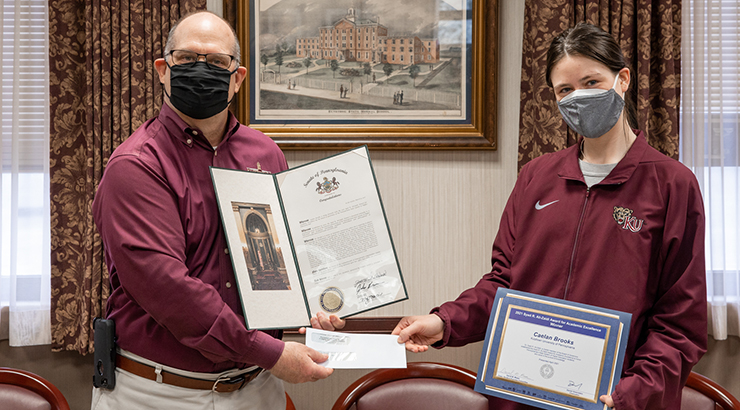Physics Program
In the Physics program at Kutztown University, we pride ourselves on fostering an open and friendly environment where the faculty is easily approachable and always ready to help. With concentrations in four specialty areas, a wealth of opportunities are at your fingertips. We are dedicated to helping every student achieve his or her career goals.
Some of the assets of our program include:
- Individual access and attention from faculty
- Small class sizes for major-specific courses
- Access to advanced laboratory facilities and equipment
- Opportunities for undergraduate research with faculty mentors
- Flexible curriculum

The Physics program offers a comprehensive curriculum, covering all major courses of study necessary for an undergraduate degree in physics. Students have the option to concentrate in four possible areas.
One Degree, A WORLD of possibilities
Kutztown also has one of the lowest tuition rates in the region (collegestats.org) for a Bachelor's degree, while maintaining a strong competitive edge manifest in the success of our graduates in a variety of careers.
MISSION STATMENT
The mission of the Kutztown University Physics Program is to provide students the opportunity to specialize in physics, astronomy, engineering, and related fields with a diverse and innovative curriculum, personalized academic advising, and professional research mentorship. Combined with providing science literacy through engaging general education courses and dynamic community outreach, the program addresses STEM workforce needs at the local, regional, and national level by supporting educational attainment and contributing to economic, social, and cultural development.
Program Highlights
KU GRADUATE EARNS HER PHD IN PHYSICS
KU graduate Amanda Portoff (Class of 2019) successfully defended her doctoral dissertation titled “Vibrational Spectroscopy as a Probe of O-H and O-D centers in the Ultra-Wide Bandgap Semiconductor β-Ga2O3” at Lehigh University on December 7th. Congratulations to Dr. Portoff on a terrific accomplishment. We wish her the best in her future endeavors.
Abstract
β − Ga2O3 is an ultra-wide bandgap semiconductor whose properties make it promising for high-power and extreme environment applications. Hydrogen has strong effects on the electrical properties, giving rise to shallow donors and the passivation of deep acceptors. The introduction of hydrogen by annealing in an H2 ambient, proton implantation, and plasma exposure gives rise to both hydrogen and native defects with which it interacts. Low-temperature vibrational spectroscopy is used to investigate the microscopic defect processes that are responsible for the effects that hydrogen and deuterium impurities have on the electrical properties of β − Ga2O3. The dominant O-H center at 3436 cm−1 has been assigned to a Ga(1) vacancy with two equivalent hydrogen atoms.
Introduction of the deuterium isotope into β −Ga2O3 samples yields spectra with significantly higher signal-to-noise and these are focused on throughout these experiments. Investigating the polarization dependence of the vibrational absorption of the VGa(1) −2D center with a vibrational line at 2546 cm−1 allows for the determination of the principal dielectric axes of β − Ga2O3 in the nearinfrared. The vibrational transition moment directions are also determined from the polarization dependence of these defects and provide additional information about defect structures.
Ion implantation of H+ and D+ produces additional O-H and O-D centers in addition to the dominant VGa(1)−2H(D) defect in β−Ga2O3. The additional defects can be converted into the VGa(1) − 2H(D) by thermal annealing. O-H and O-D lines that involve deep acceptor impurities have been observed at very similar vibrational frequencies in β − Ga2O3 samples annealed in an H2 or D2 ambient. The vibrational properties of these complexes were investigated to differentiate between them and determine their defect structures.
Many O-H and O-D vibrational lines have been observed in β − Ga2O3 but none had absorption with a component of their polarization with E ∥ [010], or b axis. Experiments performed for Czochralski grown β − Ga2O3 samples annealed in an H2 or D2 ambient have led to the discovery of weak O-D lines at 2475 and 2493 cm−1 with a component of their polarization with E ∥ [010]. This property is consistent with a structure involving a vacancy at the Ga(2) site. Infrared spectroscopy measurements were used to aid in proposing defect structures involving D trapped at a Ga(2) vacancy.
O-D centers in β − Ga2O3 evolve upon annealing in an inert ambient and are transformed from one O-D center to another. These reactions are investigated and reveal multiple classes of O-D centers that convert into one another based on their thermal stabilities. The absorption arising from free carriers also allowed the conductivity of β − Ga2O3 samples to be monitored as defect reactions occurred. The combination of vibrational spectroscopy and free-carrier absorption allowed for a relationship between conductivity changes caused by hydrogen to specific microscopic defect processes to be proposed.
KU Physics Major Awarded Top US National Honor for Physics Research
October 2021 ... Kutztown University Physics Graduate, Caelan Brooks ’21, is the recipient of the LeRoy Apker Award of the American Physical Society (APS), which recognizes outstanding achievements in physics by undergraduate students. This is the highest honor awarded to undergraduate physicists in the United States with only two awards presented each year (one to a student from a Ph.D. granting institution, and one to a student from a non-Ph.D. granting institution). Her award cites: “the discovery of distinct dynamical regimes for coherent ultracold atoms confined in a ring-shaped lattice potential; and for developing a statistical model that depicts the formation of phenotypic patterns associated with bacterial biofilm growth."
Caelan Brooks graduated summa cum laude from Kutztown University in 2021 with a B.S. in Physics and minors in Mathematics and Spanish. She worked with Prof. Kunal K. Das on ultra-cold atoms trapped in ring-shaped lattices, demonstrating the existence of two distinct dynamical regimes with continuous transition possible via rotation. She and Prof. Das further examined the quantum states of lattices with cylindrical topology in the context of synthetic gauge fields and explained gauge-sensitive features that emerge due to the periodic boundary condition. Through an REU program at Boston University, Caelan also investigated the emergence of unique phenotypic patterns in Bacillus subtilis bacterial biofilms. With Prof. Joseph Larkin of BU and Prof. Andrew Mugler of the University of Pittsburgh, she created a model for the underlying intercellular interactions that describe the emergence of macroscopic fractal-like patterns seen in experiments. Caelan is the first author on three papers tied to her work, in journals such as Physical Review A. She is the recipient of the Chambliss Gold Medal, the KU Sesquicentennial Academic Honors Scholarship, and the Syed R. Ali-Zaidi award cited by the Pennsylvania State Congress. During her three years as an undergraduate, she maintained a perfect GPA, was a member of the nationally ranked KU women’s soccer team and served on the executive board of the local SPS chapter. Caelan is currently pursuing a doctorate in Physics at Harvard University.

Caelan Brooks receives the Syed R. Ali-Zaidi Award for Academic Excellence
April 2021 .... The Syed R. Ali-Zaidi Award for Academic Excellence is conferred upon a graduating senior from one of the Pennsylvania State System of Higher Education universities. Kutztown University's Caelan Brooks was presented as the 2021 winner of the Syed R. Ali-Zaidi Award for Academic Excellence Thursday morning at the State System's virtual Board of Governors meeting. Brooks, a physics major, marks the second-straight award winner for Kutztown University and its Department of Physics, following 2020 winner Daniel Johns ’20. A native of Bear, Del. and Appoquinimink High School, Brooks has conducted high quality physics research that has led to innovations in two separate areas of physics: atomic molecular and optical (AMO) physics and biophysics, resulting in one peer-reviewed paper published and three more in development. Her work has been recognized by multiple awards and by acceptances into some of the top physics doctorate programs in the world. Brooks will continue her education at Harvard University.

Caelan Brooks receives Chambliss Gold Medal
April 2021 .... Caelan Brooks is a physics major graduating in May from Bear, Del. She is awarded the Chambliss Academic Achievement Award Gold Medal in the category of successfully completed research project. Brooks has conducted high quality physics research that has led to innovations in two separate areas of physics: atomic molecular and optical (AMO) physics and biophysics, resulting in one peer-reviewed paper published and three more in development. Her work has been recognized by multiple awards and by acceptances into some of the top physics doctorate programs in the world. Brooks will continue her education at Harvard University.

Dan Johns receives the Syed R. Ali-Zaidi Award for Academic Excellence
July 2020 .... The Syed R. Ali-Zaidi Award for Academic Excellence is conferred upon a graduating senior from one of the Pennsylvania State System of Higher Education universities. Kutztown University's Daniel Johns ’20 was presented as the 2020 winner of the Syed R. Ali-Zaidi Award for Academic Excellence at a ceremony on the KU campus. Johns, of Orwigsburg, Pa., graduated with a Bachelor of Science in physics and astronomy. A prolific researcher, Johns' work has contributed significant results from his research in the fields of exoplanets and interacting binary stars. Johns has published six research papers in professional, peer-reviewed journals, was a primary author on a piece published in The Astronomical Journal and multiple in various issues of Monthly Notices of the Royal Astronomical Society. Johns has also delivered four conference presentations on his research, including his discovery and characterization of KELT-23Ab, a new, Jupiter-like exoplanet.







